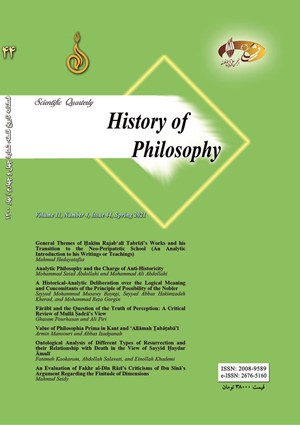Ontological Analysis of Different Types of Resurrection and their Relationship with Death in the View of Sayyid Ḥaydar Āmulī
Subject Areas : Connection of philosophers’ views and philosophical schools with the social and philosophical conditions of the timeFatemeh Kookaram 1 * , Abdullah Salavati 2 , Einollah Khademi 3
1 - PhD candidate of Islamic Philosophy and Kalam, Shahid Rajaee Teacher Training University, Tehran, Iran
2 - Associate Professor, Department of Islamic Philosophy and Kalam, Shahid Rajaee Teacher Training University, Tehran, Iran
3 - Professor of Islamic Philosophy and Kalam, Shahid Rajaee Teacher Training University, Tehran, Iran
Keywords: Resurrectiontypes of resurrectionontological analysisvoluntary deathSayyid Ḥaydar Āmulī,
Abstract :
Resurrection commonly refers to objective resurrection, the details of which have been explained in divine religions. However, some gnostics such as Sayyid Ḥaydar Āmulī have presented and elucidated different types of resurrection based on spiritual and subjective interpretations of this concept. He refers to some resurrections which are mostly connected with voluntary death. This study mainly focuses on the question of what the relationships between death and different types of resurrection are. The findings of the investigation indicate that Sayyid Ḥaydar Āmulī divides resurrection into objective and subjective types and then divides each into two formal and spiritual categories. Later he classifies each formal and spiritual form into minor, middle, and major types and; hence, refers to 12 types of resurrection. In other, words, in his view, resurrection is of various types, most of which are related to voluntary death. He maintains that Man should die a voluntary death in order to witness different forms of resurrection. The findings of this study also show that the death Āmulī discusses leads to Man’s continuity; frees them from the limits of this-worldly life; expands their worldview; opens new horizons before them, and grants depth to their life, their selves, and their insight. A human being who does not seek a voluntary death and lives a worldly life is, in a sense, a dwarf or insignificant person.
آشتیانی، سیدجلال¬الدین (1380) شرح مقدمه قیصری بر فصوص ¬الحکم، قم: بوستان کتاب.
آملی، سيدحيدر (1368) جامع¬الأسرار و منبع¬ الأنوار، تهران: علمی و فرهنگی.
آملی، سيدحيدر (1382) انوارالحقیقة و اطوار الطریقة و اسرار الشریعة، تصحیح سیدمحسن موسوی تبریزی، قم: نور علی نور.
آملی، سيدحيدر (1422ق) تفسیر المحیط الأعظم، تصحیح سیدمحسن موسوی تبریزی، تهران: سازمان چاپ و انتشارات وزارت فرهنگ و ارشاد اسلامی.
ابنعربی، محی¬الدین (1994م) الفتوحات المکية، تحقیق و تصحیح عثمان یحیی، بیروت: دار احیاء التراث العربی.
قیصری، داود بن محمود (1363) شرح فصوص الحکم، قم: بیدار.
مجلسي، محمدباقر (1403ق) بحارالأنوار، بيروت: دار إحياء التراث العربي.
ملاصدرا (1382) الشواهد الربوبیة فی المناهج السلوکیة، تصحیح و تحقیق سیدمصطفی محقق داماد، تهران: بنیاد حکمت اسلامی صدرا.

